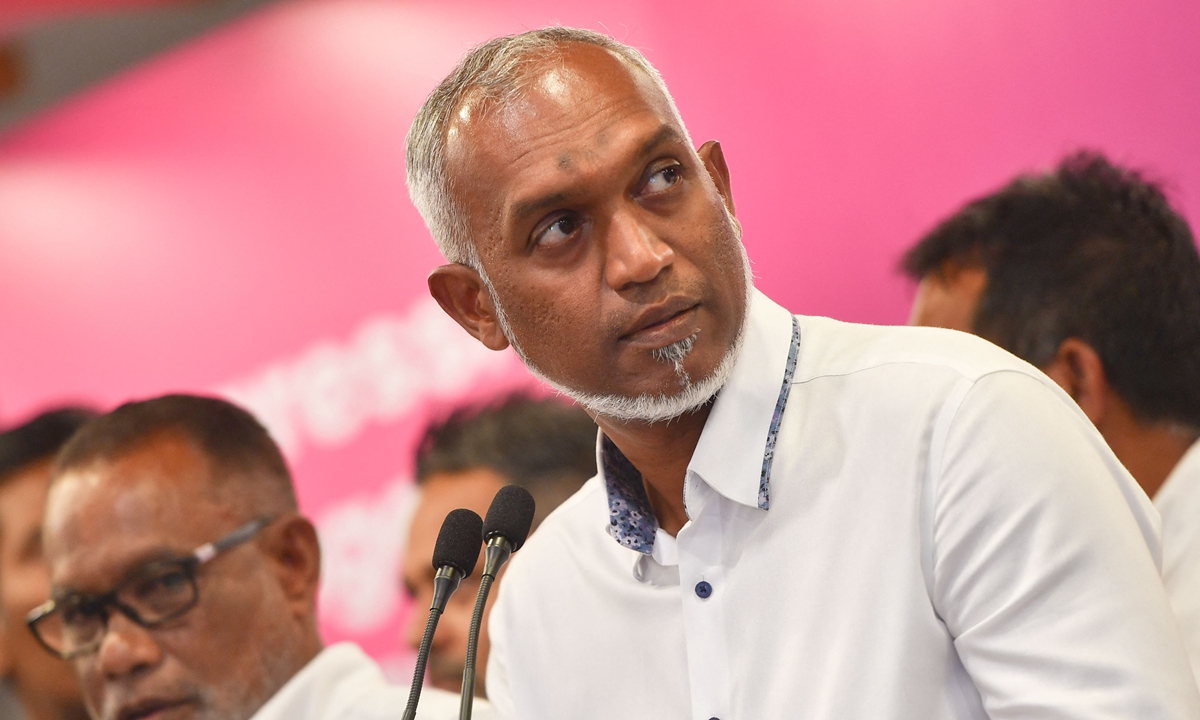
Mohamed Muizzu, the newly elected President of the Maldives. Photo: VCG
The newly elected President of the Maldives, Mohamed Muizzu, will be officially inaugurated on Friday. Muizzu, who is seen as pro-China, defeated the former President Ibrahim Mohamed Solih. Some media outlets, especially those from the US, have reported that Muizzu "will try to institute some pro-China policies," symbolizing an "important diplomatic setback for India in its own backyard." Such comments, which often use a Cold War mentality to smear normal interactions between countries and deliberately provoke geopolitical friction, are essentially an attempt to cover up a phase of failure in US and India's policies toward the Maldives.In recent years, the post-Cold War era has witnessed frequent turbulence in the US-led neoliberal international order, leading to an escalating power struggle among major countries in the Indian Ocean. It forms a geopolitical vortex that entangles countries within and around the region. The Maldives, being caught in this vortex, is inevitably influenced by the international situation in its domestic and foreign policies. However, the decisive factor of the election still remains to be the internal demands for economic and social development in the Maldives.
In 2013, Abdulla Yameen was elected as the President of the Maldives, and his achievements during his tenure mainly focused on the economy. In order to change the industry structure that relied too heavily on the tourism sector, Yameen attempted to diversify Maldives' economy. Participating in the China-proposed Belt and Road Initiative provided Yameen's government with support in terms of finance, know-how and technology. From 2010 to 2019, China has consistently been the largest tourist market for the Maldives. In the fields of digital economy and addressing global climate change, which are crucial to the future development and even the fate of the Maldives, there is also extensive room for further cooperation between China and the Maldives.
At the same time, the Yameen government also tried to maintain cooperation with India and the US. However, the warming relations between the Maldives and China still caused dissatisfaction in India and the US. In February 2018, a political crisis occurred in the Maldives, and the Trump administration took the opportunity to pressure the Yameen government, criticizing it for its moves against opposition forces, and to interfere in the Maldivian presidential election that year. In the end, the opposition Maldivian Democratic Party candidate, Solih, defeated Yameen and won the election.
After Solih came into power, he purged the Yameen government's policies domestically and actively responded to the Trump administration's Indo-Pacific Strategy, attempting to return to the diplomatic tradition of "India first" and repair relations with India. However, Solih's pro-US stance and "India first" strategy did not achieve significant results in the economic and livelihood sectors, which was the main reason for his defeat in the 2023 presidential election. The Maldives has yet to recover from the economic difficulties caused by the pandemic. In early October, the World Bank pointed out that the Maldives will have to repay a debt of up to $1.07 billion by 2026.
Compared to China and the US, India has a natural geopolitical advantage in developing relations with the Maldives. However, its condescending attitude toward neighboring countries makes it difficult to trust. And it does not yet have the ability to help the Maldives achieve healthy and sustainable economic development.
The US only sees the Maldives as a geopolitical pawn and has no intention of investing more resources in its long-term development. China, with its economic size and influence, can continuously inject vitality into the Maldivian economy. However, the geographical distance between China and the Maldives, combined with deliberate smearing by media outlets from the US, India, and other countries, as well as political interference, has hindered the development of China-Maldives relations. Regarding China-Maldives relations, China adheres to the concept of peaceful development, mutually beneficial cooperation and common prosperity, advocating the construction of a global community of shared future, which aligns with the fundamental interests of the Maldivian people. This serves as an important foundation for China to establish closer cooperation with the Maldives under the leadership of President Muizzu.
As a sovereign country, the Maldives has the right to independently determine its foreign policy. The foreign policy of the Muizzu government may also undergo unpredictable changes due to domestic and international factors. However, in order to maximize the satisfaction of the economic and social development demands of its people, the Muizzu government will likely strive to maintain equidistant diplomacy among major countries, which will create opportunities for the stable and positive development of China-Maldives relations.
Li Junlin is a researcher at Indian Ocean Rim Research Center for Island Countries. Liang Guojie is an executive Director of Indian Ocean Rim Research Center for Island Countries. opinion@globaltimes.com.cn

